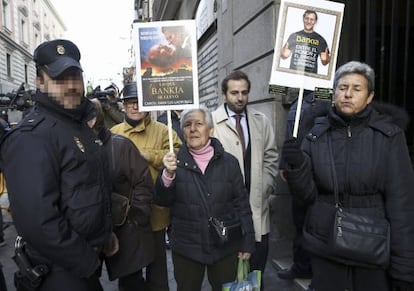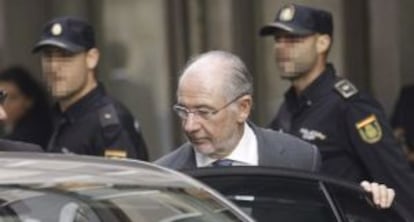Caja Madrid execs were “encouraged” to use their undeclared credit cards
Ten ex-bosses at bank answer judge’s questions about €15.5 million expenses scandal

Ten former board members at failed lender Caja Madrid told a judge on Monday that ex-chairman Miguel Blesa was behind the use of undeclared corporate credit cards to rack up millions in personal expenses between 2003 and 2012.
Another 17 people will give evidence at the High Court between now and Wednesday in connection with a scandal that triggered a cascade of resignations and dismissals when it broke in October of last year.
Between 2003 and 2012, 82 executives and board members at Caja Madrid and its successor Bankia were given credit cards that drew money from a bank fund yet did not show up on any bank documents or job contracts. Recipients racked up €15.5 million in personal expenses that were never declared to tax authorities.
There were contradictory explanations as to whether the cards were to cover representation expenses or whether they were part of their wages
The case also ensnared former IMF chief and one-time Spanish deputy prime minister Rodrigo Rato, who headed Caja Madrid and Bankia between 2010 and 2012. Following intense political pressure, Rato volunteered to have his Popular Party (PP) membership temporarily revoked until his role was cleared up.
According to sources present in court, nearly all the board members who testified on Monday told Judge Fernando Andreu that when Blesa took over Caja Madrid in 1996, there was a change in the way the “black” cards were used.
Originally created to cover recipients’ representation costs and used “prudently,” the credit cards started being employed to pay for personal expenses.
Pedro Bedia, a former board member appointed by the CCOO labor union, reportedly said he received the occasional call from Caja Madrid “encouraging me to spend the entire assigned amount.”
The same sources said there were contradictory explanations from those questioned as to whether the cards were meant to cover representation expenses or whether they were part of their wages.
Anti-corruption attorney Alejandro Luzón asked for civil liability bonds from six of the 10 targets of the investigation to cover their credit card use. The other four convinced the prosecutor that their use of the card was directly tied to their work as Caja Madrid representatives.
One of the 10, José Antonio Moral Santín, who was appointed to the board by the United Left coalition, said the €456,600 he spent on the card represented wages, and that he failed to pay tax on it because Caja Madrid was already doing so through a deal with the Tax Agency.
But all the other targets of the probe said they used their cards to cover the cost of representing the bank.
Sources said the judge did not focus so much on individual expenses as on trying to clear up this point.
Other individuals who testified before the judge include a former Socialist mayor of Móstoles (Madrid), who spent €139,000; four labor union officials who racked up between €99,300 and €140,600; and two representatives of the CEOE employers’ association, including its former president Gerardo Díaz Ferrán, who is in prison over unrelated issues.

In late January, Judge Andreu targeted 79 beneficiaries of the credit cards, and imposed civil liability bonds of €16 million and €3 million on former chairmen Miguel Blesa and Rodrigo Rato for their alleged role in the scandal.
On Friday, Andreu will hear testimony from Jaime Terceiro, a former Caja Madrid chairman under whose tenure the black credit cards were allegedly created, and from the only four bank execs who never used them.
The judge underscored that if the cards were meant to cover representation costs, they were “outside the ordinary circuit” by which credit cards were issued at the bank, had no contract to back them up, and did not receive official backing from management bodies.
Andreu also noted Bankia’s reminder that the former execs also had another company credit card at their disposal, and wondered about the personal nature of the expenses on the black cards, which included groceries, clothing and cash withdrawals.
If the amounts enjoyed by each bank boss were instead a part of their salaries, the judge said he failed to understand “the reason why some of the beneficiaries did not use their cards, or why most of them did not entirely use up their allowances.”
Tu suscripción se está usando en otro dispositivo
¿Quieres añadir otro usuario a tu suscripción?
Si continúas leyendo en este dispositivo, no se podrá leer en el otro.
FlechaTu suscripción se está usando en otro dispositivo y solo puedes acceder a EL PAÍS desde un dispositivo a la vez.
Si quieres compartir tu cuenta, cambia tu suscripción a la modalidad Premium, así podrás añadir otro usuario. Cada uno accederá con su propia cuenta de email, lo que os permitirá personalizar vuestra experiencia en EL PAÍS.
En el caso de no saber quién está usando tu cuenta, te recomendamos cambiar tu contraseña aquí.
Si decides continuar compartiendo tu cuenta, este mensaje se mostrará en tu dispositivo y en el de la otra persona que está usando tu cuenta de forma indefinida, afectando a tu experiencia de lectura. Puedes consultar aquí los términos y condiciones de la suscripción digital.








































